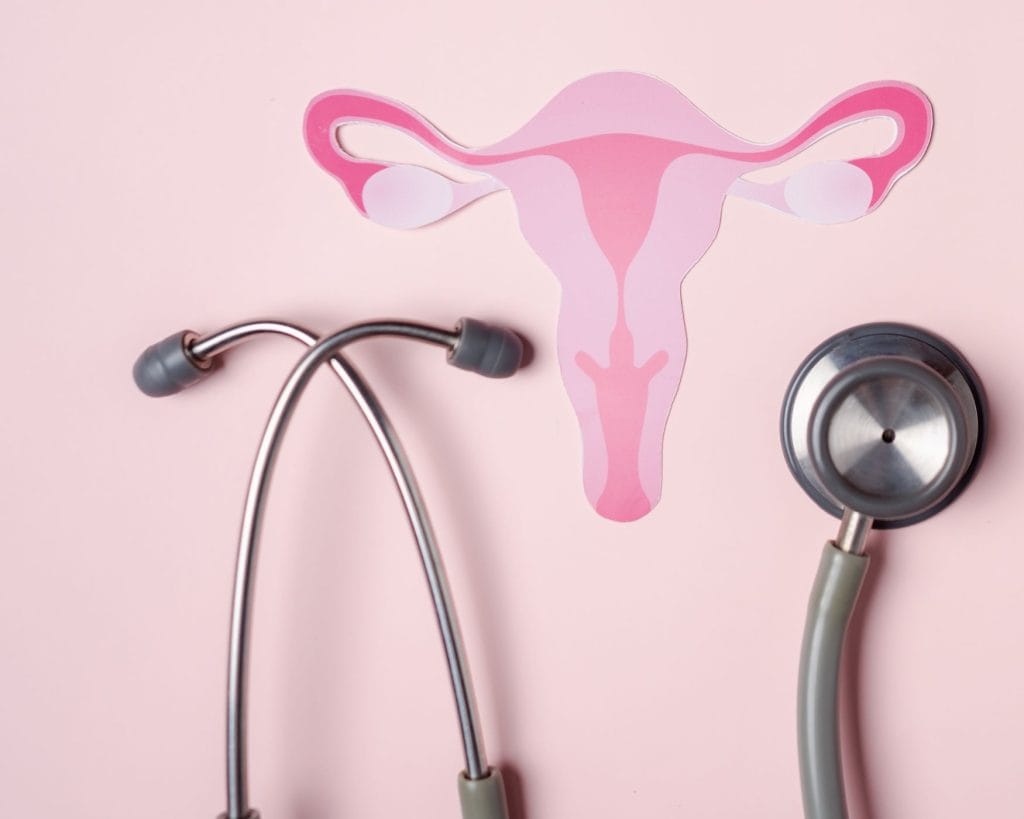Typically, women with PCOS don’t experience sickness; however, fatigue is a common symptom. People often brush off their fatigue as something insignificant, like difficulty sleeping or stress, which is why PCOS can go undetected for extended periods.
Here, we’ll investigate the impact of PCOS on general health and answer the question, “Can polycystic ovaries make you feel sick?”
What Is Polycystic Ovarian Syndrome?
PCOS is a condition that causes a higher-than-normal level of male hormones (androgens) in women.
It is characterized by the presence of multiple small cysts (follicles) on the ovaries, irregular or absent periods, and excessive production of male hormones (androgens).
Common Symptoms of PCOS
Well, women often ask about this, like Can polycystic ovaries make me unwell, or Can PCOS cause nausea and fatigue? So here, we talk about it in detail.
Ok, let’s go over the symptoms of PCOS.
- Hair growth in unwanted areas, such as the face, chin, breasts, stomach, or thumbs and toes. This is called “hirsutism.”
- Thinning hair on the head could worsen with age.
- Acne or oily skin due to hormone changes caused by PCOS. But don’t worry; you can still have these skin problems without PCOS.
- Dark, thick, velvety patches of skin under your arms, breasts, on the back of your neck, and in your groin area. This is called acanthosis nigricans.
- Problems sleeping or feeling tired all the time could be due to sleep apnea.
- Surging hormones cause headaches.
- Women with PCOS may have irregular menstrual cycles or no periods.
- Big swings in the menstrual cycle, including heavy bleeding and frequent periods.
- Missing periods or having it skip a few months.
- Weight gain or having a hard time losing weight. This could worsen the symptoms, but losing even a few pounds could help with the timing of your periods. Keeping your cholesterol and blood sugar levels in check is important if you have PCOS.

Diagnosing PCOS
According To CDC, It’s a health condition that causes female infertility in 6-12% (almost 5 million ) of women of reproductive age. But it’s not just a problem for child-bearing years. PCOS is a lifelong condition that goes beyond infertility.
To diagnose it, your healthcare provider:
1. Will ask about your medical history and symptoms.
2. Will conduct a physical exam, including a pelvic exam. This exam checks for the health of your reproductive organs, both inside and outside of your body.
To further confirm the diagnosis and rule out other health problems, you may also have the following tests done:
1. Ultrasound: This non-invasive test uses sound waves and a computer to create images of blood vessels, tissues, and organs. It helps to determine the size of your ovaries and see if they have cysts. This test also looks at the thickness of the lining of your uterus (endometrium).
2. Blood tests: These tests look for high levels of androgens and other hormones in your blood. Your healthcare provider may also check your blood glucose levels and your cholesterol and triglyceride levels.
4 Types of PCOS
Did you know? By the age of 40, over 50% of women diagnosed with PCOS develop type 2 diabetes. Depending on what has provoked your disease, it is subdivided into four types:
- Post-Pill
- Insulin resistant PCOS
- Adrenal
- Inflammatory
So, let’s deep dive into each reason for their appearance and corresponding treatment prognosis.
Post-Pill
After stopping the oral contraceptive pill, post-pill PCOS can occur, which is characterized by symptoms like acne and irregular periods that weren’t present before taking the pill; certain oral contraceptives, such as Ginet, Yasmin, and Yaz, are more likely to lead to post-pill PCOS due to the type of synthetic progestins they contain.
Once you stop taking the pill, your ovaries experience a surge in androgens, which can cause typical PCOS symptoms.
Still, unlike in insulin-resistant PCOS, no insulin resistance is involved in post-pill PCOS.
This type of PCOS usually develops in clients three to six months after discontinuing the pill.
Let’s consider this treatment :
- Remember that this type of PCOS is temporary. It can take some time to reverse, but it will improve.
- Get professional help. Speak to a practitioner about your symptoms, and discuss supplementation options with them. Nutrients such as magnesium, vitamin B6, vitamin E, and zinc, as well as specific herbs like chaste tree and peony, can help support ovulation and reduce excess androgens.
- Prioritize sleep and stress management. Like in insulin-resistant PCOS, getting good quality sleep and reducing stress levels is important for maintaining overall hormonal balance.
Adrenal
Adrenal PCOS, which affects about 10% of those diagnosed, is caused by an abnormal stress response that elevates DHEA-S, a type of androgen from the adrenal glands, without causing high testosterone levels and androstenedione.
Unfortunately, this type of androgen is often only tested if you consult an endocrinologist or other specialist.
To manage adrenal PCOS, follow these steps:
- Manage stress by engaging in yoga, meditation, mindfulness, and journaling to support your nervous system and hormones.
- Ensure you sleep at least 8 hours each night to support stress levels and recovery.
- Limit excessive and high-intensity training as this can put stress on your adrenals.

Insulin resistant PCOS
Typically, it affects around 70% of people and is the most common type of PCOS. You may experience symptoms like weight struggles, sugar cravings, fatigue, or brain fog and hold weight around your stomach/abdomen.
These symptoms are caused by high insulin levels in your body, which also drive up androgen levels and cause excess hair, male pattern hair loss, and acne.
It would be best if you had your fasting insulin levels tested to check for insulin resistance.
Doctors often just test HbA1c or glucose levels, which only provide some information about your blood sugar levels. Normal fasting insulin levels are less than ten mIU/L (60 pmol/L).
To help treat insulin-resistant PCOS, take these steps:
– Regular exercise and movement throughout the day can help your body burn sugar, build muscle, and improve your insulin sensitivity.
– Avoid high-sugar foods and have a lower carbohydrate diet rich in protein and fat to balance blood sugar levels.
– Prioritize sleep and reduce stress to help manage blood sugar and insulin levels.
Inflammatory
Thus it happens when chronic inflammation causes your ovaries to make too much testosterone, leading to physical symptoms and issues with ovulation.
You might notice signs of inflammation such as headaches, joint pain, unexplained fatigue, skin issues like eczema, and bowel issues like IBS.
When you get a blood test, you’ll likely see raised inflammatory markers like a high CRP (C reactive protein) above 5. Other tests like fasting glucose and insulin are usually normal, but inflammation can sometimes affect these numbers too.
To help manage your inflammatory PCOS, there are a few things you can do:
- Take care of the health of your gut. All of these things can help lower inflammation: fixing gut tissue that leaks, keeping gut bacteria in balance, improving digestive enzymes, and getting rid of pathogenic bacteria.
- Pay attention to what you’re eating. Identify potential food sensitivities and remove inflammatory foods from your diet. Figuring out what foods trigger an inflammatory response can be tricky, so working with a nutritionist who can guide you through this might be helpful.
Where Can I Get Help?
Looking for help with PCOS? Here’s what you can do:
- Schedule an appointment with your GP.
- Consider seeing a gynecologist or endocrinologist, depending on your needs.
- Check with your local women’s health clinic or community health center.
- Seek guidance from a dietitian to manage your symptoms.
- Consult an exercise physiologist to create a fitness plan tailored to your needs.
Sum Up
As you know, PCOS is a hormonal disorder that affects women of reproductive age.
However, If you are affected by it, we recommend you seek help from doctors and start treatment.
References:
https://www.nhs.uk/conditions/polycystic-ovary-syndrome-pcos/symptoms/





